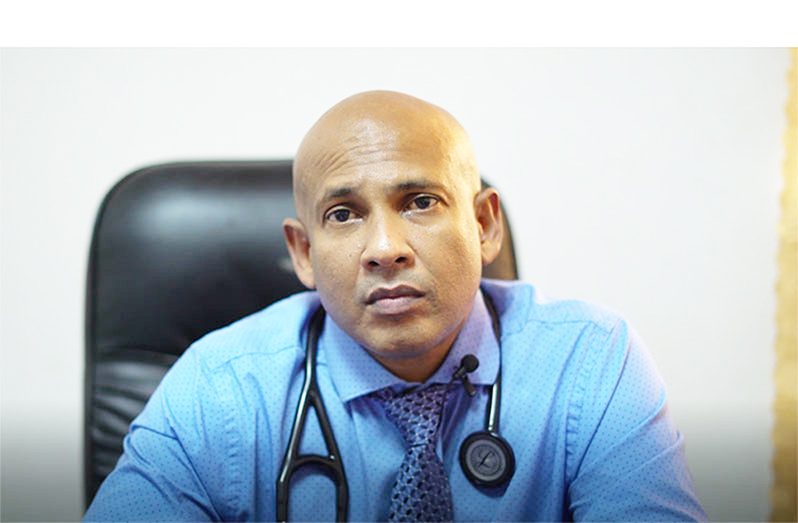–says Health Ministry making treatment more reliable through tremendous efforts
By Feona Morrison
HEAD of Medical Services and Cardiology at the Georgetown Public Hospital Corporation (GPHC), Dr Mahendra Carpen, has emphasised the critical role of lifestyle changes and regular check-ups in combating high blood pressure, a condition affecting millions worldwide.
During this week’s episode of ‘Health Matters’, a programme hosted by the Health Ministry, the renowned cardiologist, shed light on practical steps individuals can take to manage and prevent this silent yet deadly ailment.
High blood pressure, often known as hypertension, is when the force of blood pushing against the artery walls is consistently too high. It is a major risk factor for heart disease, stroke, and other grave health problems.
The World Health Organization (WHO) estimates that 1.13 billion individuals worldwide are afflicted by it, and because it is asymptomatic, many of them are unaware that they have the illness. Risk factors such as health conditions, age, family history, ethnicity, and lifestyle can increase a person’s chance of developing high blood pressure.
For the great majority of people with high blood pressure, Dr. Carpen clarified, there really is no identifiable cause. “But in a minority, there are some secondary hypertension… where you know the cause and if you treat the cause, you can alleviate the hypertension.”
“High blood pressure is the real problem. It has often been referred to as the silent killer because people don’t know that they have high blood pressure,” he explained, adding that a normal systolic blood pressure range is 90 to 140 mm Hg while diastolic is 60 to 89 mm Hg.
He explained that everyday life activities can cause blood pressure to fluctuate.
For context, he said: “During the day, as you are awake and you have to encounter all of lives challenges…in Guyana, as you drive on the road and somebody tries running you off the road. Or the traffic, heat, air conditioner not working. You are stressed out at your work…
“Blood pressure will fluctuate up and down and when you go to sleep at nights, it is supposed to drop. So, there is a normal daytime, nighttime variation in persons. When it becomes abnormally high, it is not just the individual high reading but when there is sustained high blood pressure.”
According to him, lifestyle modification and medical intervention are vital in reducing hypertension to normal/acceptable levels.
“Lifestyle essentially means adjusting to health habits. Diet includes the reduction of salt. Salt is a huge component of lifestyle change in hypertension. Chronic use of alcohol can cause hypertension. Other things for lifestyle change include exercise. Diet has its role to play in the prevention and management of hypertension. Smoking is a big one that we do not encourage.”
Importantly, the cardiologist pointed out that low blood pressure is not an issue unless it is causing symptoms like dizziness or lightheadedness; fainting; upset stomach; blurred or distorted vision; fast, shallow breathing; fatigue or weakness; confusion; agitation and tiredness.
Additionally, the cardiologist pointed out that an often under-recognised issue in patients of African descent is the imbalance of certain hormones, which can lead to electrolyte disequilibrium. He emphasised that early recognition of this condition is essential.
He disclosed that the Ministry of Health is well-equipped to address the widespread issue of hypertension through its comprehensive healthcare infrastructure and dedicated initiatives
Describing one of the programmes as “well-thought-out”, he said, “It includes not just medical intervention but lifestyle, counselling patients, monitoring them et cetera.”
He also referenced the HEARTS initiative, which was launched a few years ago, to assist primary healthcare professionals in preventing and detecting cardiovascular diseases and hypertension at an early stage. In closing, he reiterated that high blood pressure is a major health issue and urged individuals to take control of their blood pressure.
Dr Carpen said: “The Chronic Disease Secretariat through the Ministry of Health is developing a very robust programme that includes protocols of identifying patients, screening them, treating them and trying to standardise the care across the spectrum, whether it is public of private.
“Most importantly, they are looking at making the interventions, in this case, medicines, available on a continuous, reliable basis to all patients in the country. The ministry is working tremendously hard to make appropriate care available to all persons requiring care.”
He stressed that pain behind the neck is no longer a reliable indicator of hypertension, and therefore, encouraged people to regularly check their blood pressure.



.jpg)








